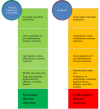Probiotics in Allergy and Immunological Diseases: A Comprehensive Review
- PMID: 38590477
- PMCID: PMC10999892
- DOI: 10.7759/cureus.55817
Probiotics in Allergy and Immunological Diseases: A Comprehensive Review
Abstract
Allergy and immunological disorders like autoimmune diseases are vastly prevalent worldwide. These conditions account for a substantial amount of personal and social burden. Such illnesses have lengthy, uncertain, and spotted courses with unpredictable exacerbations. A definite tendency for improving the overall quality of life of individuals suffering from such diseases is crucial to tackling these diseases, especially through diet or lifestyle modification. Further, interventions like microbiome-based therapeutics such as prebiotics or probiotics were explored. Changes in the microbial population were evident during the flare-up of autoimmune and allergic conditions. The realization that the human microbiome is a central player in immunological diseases is a hallmark of its potential usefulness in therapy for such illnesses. This review focuses on the intricate symphony in the orchestra of the human microbiome and the immune system. New therapeutic strategies involving probiotics appear to be the future of personalized medicine. Through this review, we explore the narrative of probiotics and reaffirm their use as therapeutic and preventive agents in immunological disorders.
Keywords: allergy; autoimmune diseases; immune system; immunological disorders; personalized medicine; prebiotics; probiotics.
Copyright © 2024, Vijayan et al.
Conflict of interest statement
The authors have declared that no competing interests exist.
Figures
References
-
- Review article: bifidobacteria as probiotic agents -- physiological effects and clinical benefits. Picard C, Fioramonti J, Francois A, Robinson T, Neant F, Matuchansky C. Aliment Pharmacol Ther. 2005;22:495–512. - PubMed
-
- Gut flora in health and disease. Guarner F, Malagelada JR. Lancet. 2003;361:512–519. - PubMed
-
- Do bugs control our fate? The influence of the microbiome on autoimmunity. Fung I, Garrett JP, Shahane A, Kwan M. Curr Allergy Asthma Rep. 2012;12:511–519. - PubMed
Publication types
LinkOut - more resources
Full Text Sources


